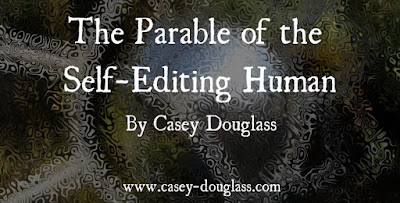The Parable of the Self-Editing Human
By Casey Douglass
There was once a man
who was wholly dissatisfied with the way he was. He disliked his
external looks while also cringing away from his internal world. He
was a brilliant mind in the world of science, and it was here that he
met his downfall.
Utilising his vast
expertise in many fields, he discovered a way to change his
appearance, his body and his brain. The machinery to do so bankrupted
him, but he believed all would be fine if he could just fix his
flaws.
He began with small
changes: an adjustment to his nose, a change in eye colour, the
correcting of an arthritic joint. He felt slightly better about
himself with each small change, and so fell into the trap of thinking
that bigger changes would yield higher amounts of self-satisfaction.
He became more
ambitious, changing his muscle structure, sluicing fat from unwanted
places, broadening his shoulders, extending his penis. He praised
himself on the self-restraint he displayed on this last one, only
making it big enough to ease his concerns of being below average in
that department.
It was during his
renovations that he realised he had little idea as to what the most
attractive features were for a man. He made copious use of his
research network, and even ran his own experiments with photo sharing
and rating websites. He posted photos with one variable changed in
each picture, and gauged the results by way of the likes and
favourites that each image garnered.
His form continued to
change as he incorporated the spoils of each research project into
his being. He began to be pestered in the street by all varieties of
people of any gender, people that wanted to know more about this
alluring and handsome man, particularly why he strolled in such a
hunched manner.
The man’s changes had
done little for his underlying mental states, and it was towards
these that his mind now turned. Every undesirable thought and emotion
was erased, deleted and binned. The slightest irritation was muffled
by a pillow of quietude, every surge of panic castrated and
evaporated by the humming machine nodes attached discretely to his
spine. He began to walk more upright, more assured.
It only took seven days
for his body and mind to be purged of all unpleasant fears, doubts
and emotions. He stood before the mirror and gazed at the reflection,
but rather than this being a case of narcissus, he realised that the
stranger before him was both him and not at all him. He felt null
about this, the closest he now came to any uncomfortable emotion, and
promptly asked his machine to remove this feeling too.
He was still hounded by
a strange disconnect while he went about his days, and with no real
caution left, he attempted to erase all memory of who he was before
his change. It was a delicate affair, having to unpick all imagery
and sensation that linked to the old him, while not affecting any
other content in his mind. His intelligence collapsed in the manner
of someone sucking the air out of a balloon. First it wrinkled, then
it shrivelled, then it lay limp and motionless. The machine could not
search and sort with the accuracy required to preserve his
personality.
In the process of
trying to improve himself, the man lost himself, and it is for this
reason that the State of Jitan Six has decreed that humans are only
permitted to make three minor changes in one lifetime. They are a
peculiar race, and wholly untrustworthy with the technology at their
disposal. They are still integrating into the Galactic Council. They
are young and they will learn, but for now, we must moderate them
before they eradicate themselves or worse, become a danger to the
other species under our care.
THE END

